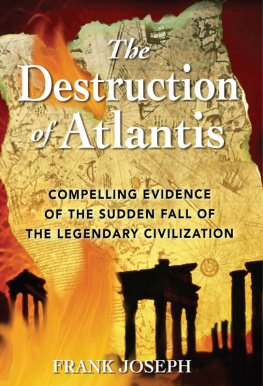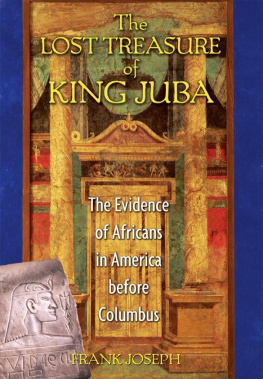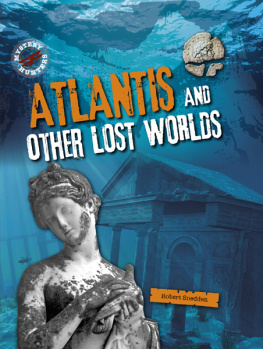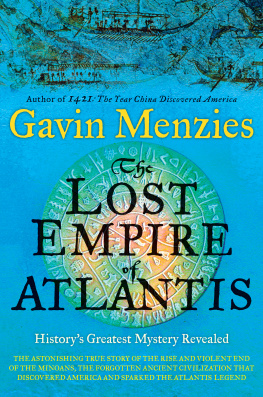The Destruction of Atlantis
Compelling Evidence of the Sudden Fall of the Legendary Civilization
FRANK JOSEPH

Bear & Company
Rochester, Vermont
To Kenneth Caroli, Atlantologist extraordinaire

Contents

INTRODUCTION
Atlantis Madness
Reading made Don Quixote a gentleman. Believing what he read made him mad.
George Bernard Shaw
The grizzled Arab in his full-length black galabiya grunted and motioned impatiently for my canteen. I hesitated. In North Africa fresh water and life are one and the same, and I was alone, a heathen American in a forsaken corner of Islamic Morocco, come to search the gaunt ruins of a long-dead city for traces of an even older civilization. My friend, who seemed hardly less ancient, did not speak English. I knew no Arabic. He had, notwithstanding, appointed himself my unsolicited guide to Lixus.
His mostly toothless expression twisted into the grimace of a devious smile, and I reluctantly relinquished the army-surplus container. He emptied it at our feet, the priceless liquid splashing to the parched ground, then squatted to the Roman pavement. Mumbling low, as if chanting a mantra, he pressed the palm of his right hand onto the dust-laden stones and rubbed in a circular motion. Gradually, the dim outlines of a mosaic began to materialize from the drab surface.
While the old man continued to rub, muttering all the while, colors began to emerge from the porous stone: carnelian reds, corn-golden yellows, aqua blues, sea greensthe suggestion of a face took form. First, large, blue, commanding eyes, then bushy eyebrows. Then a powerful forehead, followed by long locks of golden hair, a bold nose, a mouth open, as though calling. The portrait expanded to become a vibrant scene with dolphin-filled seas behind the manifesting head. The figure began to fill out in shade and brilliance, revealing a bull neck, massive shoulders, and a strong trident. Here was the living face of the ocean god, Romes Neptune, the Greek Poseidon, in a mosaic masterpiece preserved in all its original pieces and vivid colors for two millennia. The old man who conjured this apparition stopped rubbing the stones, and almost at once the vision began to fade. The bright hues lost their shine. The face grew indistinct, as though veiled by mist, then cloud. A moment more, and it was unrecognizable. As my spilled water quickly evaporated in the North African sun, the mosaic disappeared entirely, fading back into the indistinguishable brownish gray pavement. The precious contents of my canteen had been a libation, a small sacrifice to the god of waters, who revealed his timeless face only so long as the offering lasted.
My encounter with Neptune seemed to personify the quest that brought me from my home in Colfax, Wisconsin. Like the mosaic, the object of that search lies hidden, but the proper method may yet bring it back to life. I arrived in coastal Morocco specifically to study, photograph, and most of all experience a place called Lixus, the City of Light, as the Romans left it. The ruins are not far from the broken-down town of Larache, fronting a dark blue Atlantic Ocean. Only the upper and most recent ruins of the archaeological zone were Roman.
The Romans identifiable pillars and arches rest upon the stonework of earlier, unknown architects. I traced one of these massive, perfectly square-cut monoliths with the palm of my hand and thrilled with a feeling akin to deja vu: the workmanship was uncannily reminiscent of other massive, ancient stones I had touched high in the Andes of South America and at the ocean bottom near the island of Bimini, fifty-five miles east of Florida. Before the Romans made a colony out of northwest Africa, it was the independent kingdom of Mauretania. Phoenicians from Carthage preceded the white-skinned Mauretanians. But who was building cities before they arrived?
A MATTER OF LIFE AND DEATH
Morocco was the midpoint in my single-minded search for the roots of an obsession. Weeks before, I was sitting on the red leather saddle astride a black horse riding through the desert sands in the shadow of the Great Pyramid. In the Upper Nile Valley, I heard my footsteps echo through the enormous Victory Temple of Ramses III. In Turkey, I stood on the battlements of Ilios and looked down on the great plain where Greeks and Trojans fought to the death. Everywhere, I collected pieces of a lost, prehistoric puzzle far greater than all the places I visited.
From the worlds oldest known tomb, in Ireland, and Etruscan Italys subterranean temple, beyond to Athens, where the Greek philosopher, Plato, first narrated the story that set me wandering, twenty-four centuries later, I was a driven man. Wherever I journeyed, I felt protected from men and events that on occasion threatened my life, and guided toward the answers I sought. But there were never enough answers. They were spread out like breadcrumbs before a hungry bird, always enticing me on to the next sacred site and the one beyond that.
I climbed Mount Ida, on Crete, to visit the cave were Zeus, king of the Olympian gods, had been born. There were other islands that needed visiting: In the Aegean, Santorini, its sickle shape all that remained of the volcanic explosion that vaporized a mountain, and Delos, birthplace of Apollo, god of light and enlightenment. In the broad Atlantic, Tenerife, its ominous mountain still trembling with seismic rage; Lanzarote, its tall, conical pyramids continuing to chart the progress of the sun after unknown millennia; and Gran Canaria, where I found the very signature of Atlas himself. My investigations went beyond the Old World, back across the sea to the colossal geoglyphs of fantastic animals and giant men drawn in the Peruvian desert, and to Bolivias most enigmatic city, high in the mountains. There were Mexican pyramids to climb and, not far from home, I sought out the effigy mounds of birds and serpents from Wisconsin to Louisiana.
The price paid for these and many more life-changing travels sometimes went beyond money. On Lanzarote I almost drowned when the rising tide trapped me in a seaside cave. Later, that same day, I was saved from falling into the mouth of a volcano by my walking stick. In Tangiers, I escaped a gang of cutthroats. I was less lucky in Peru, when three men strangled me into unconsciousness and left me for dead in the streets of Cuzco.
Even though this book has gone to press, it is not finished, nor ever shall be, because my ongoing travels continually unfold new dimensions in an endless search for the story which can never be known in its entirety. All these adventures were and are bent to a primary purpose: to re-connect with that which was lost. Why I want to do so may be explained through sensible rationalizationsdiscovering the roots of civilization, the alchemical thrill of transforming dramatic legend into historical realityor some such reasoned justification for incurring prodigious amounts of time, energy, money, and risk to my physical existence. But they would be only partial explanations. There is a visceral cause beyond the power of words to describe what has become the joyful obsession of my life; it exceeds mere intellectual curiosity.
Next page







